


To know where you are, you need to know who you are. The problem is, Jersey’s having a bit of a crisis.
If you happen to be reading this at the airport, do yourself a favour and take a peek at Duty Free. In a moment, you’ll soon find out why Jersey’s International Development Minister Carolyn Labey is simultaneously amused, bemused, and somewhat appalled.
On a small stand facing the restaurant, you’ll find mugs, tea towels, and a sturdy heap of smiling golden brown cows adorning fudge and biscuit boxes. If you’re lucky, there might even be some novelty ‘Jersey moo poo’.
But the scandal here isn’t that there are people in the world that genuinely consider the latter to be a thoughtful souvenir for a loved one, but that these packaged ‘pats’ – and the other boxed bites – are made in Devon and Leicestershire.
“Jersey’s ports should be saying something about the island,” the Deputy laughs, as she compares it with the assured national image of the tartan, heather, shortbread and speciality whiskey-stocked Scottish airports.
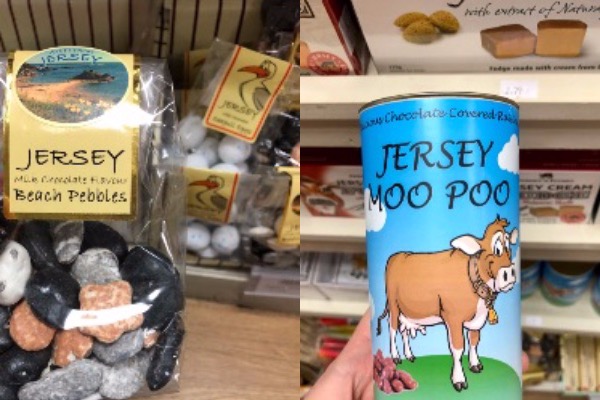
Pictured: Some boxed bites sold in Jersey's airport are made in Devon and Leicestershire.
Arrivals isn’t much better. “Here, every ad is finance – that’s all there is – and then a dinosaur,” she says, alluding to a family attraction’s promotional moving beast. “You should know where you are when you arrive.”
Travelling Jersey folk are used to being mistaken as coming from New Jersey; the international media – and around 90 MPs – insist it’s a ‘tax haven;’ and every local uni-goer will have been faced with the dichotomy of being considered a millionaire, yet somehow living on an island with no electricity or cars, and only cows for friends.
That’s part of the reason the new Chief Minister created Deputy Labey’s Ministerial role when he was elected to lead the island – to help shape Jersey’s international identity. And she’s now seizing on those stereotypes – cows and finance – and reclaiming them in her battle to show off the island’s philanthropic side.
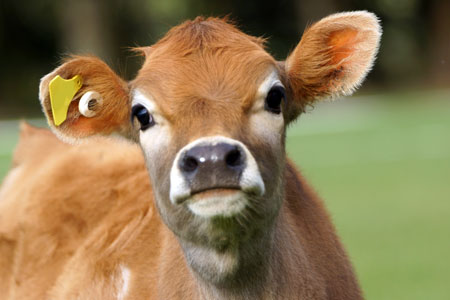
Pictured: Jersey’s International Development Minister Carolyn Labey is reclaiming Jersey stereotypes: cows and finance.
A programme by Jersey Overseas Aid (JOA) to introduce Jersey cows to some of the world’s poorest communities has transformed thousands of lives. Their milk yield and vitamin quality improve whole families’ nutrition, while also providing them with a product they can sell.
Meanwhile, a four-year collaboration between JOA and Comic Relief is improving access to affordable financial services across Rwanda, Zambia and Sierra Leone – an example of Jersey using its key skill for good.
It makes a lot of sense to focus on these areas. After all, most countries’ perceptions of a nation will revolve around what they trade with them. So what products are shaping Jersey’s image?
John Garton – a man of many island produce-related hats, heading up Genuine Jersey and Farm Jersey – describes them as “the big four”: oysters, lobsters, Jersey Dairy, and the “champagne of the potato world,” Jersey Royals. “They’re premium products that are inherently knitted into the fabric of the island,” he explains.
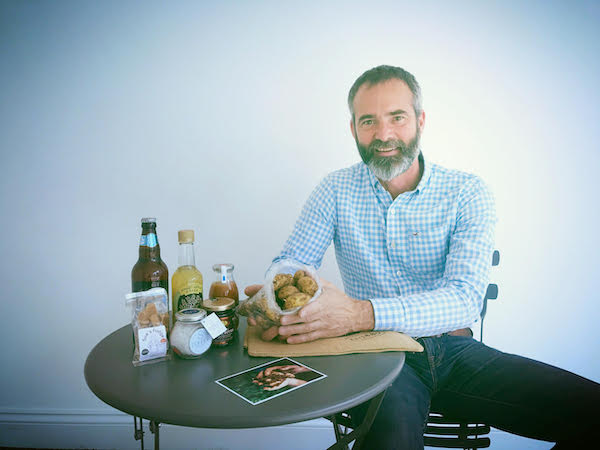
Pictured: John Garton, Chief Executive Officer of Genuine Jersey.
The cultivation of oysters, for example, is linked to Jersey’s tidal range – one of the world’s largest. “They’re filter feeders so obviously need fast-flowing water that’s nutrient rich and clean, so it's a really good crop for us.”
Jersey lobsters, meanwhile, are MSC-accredited – a recognition that the local industry is “…sustainable and the fishery is being well managed.” But despite being foodie treats, these gourmet items are, perhaps surprisingly, just as likely to be ripped off as a Hermes handbag or Burberry scarf. These are “luxury” items – and many want to milk the literal cash cow at cut price.
There is some protection in the form of the European Union’s ‘Protected Designation of Origin’ (PDO) accreditation. It’s the stamp that means a Cornish Pasty must be made in Cornwall (all others are just pasties), and that Newcastle Brown Ale’s name was put at risk when its brewery moved just across the Tyne.
Indeed, it’s an easy badge to lose; and even tougher to earn.
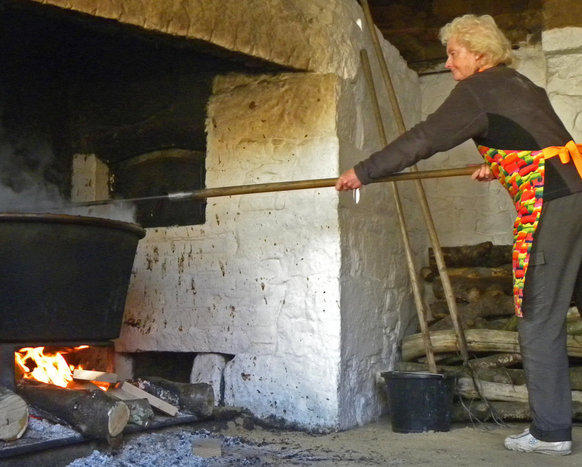
Pictured: Black butter dates back to the 1600s.
Black butter might be a historic Jersey farmhouse delicacy, dating back to the 1600s when a fifth of land was made up of orchards dropping apples faster than islanders could eat them; but that didn’t stop a Belfast entrepreneur taking inspiration from a Channel Island holiday to launch his own “unique” taste of Ireland: ‘Irish Black Butter.’
It was decided that it would be too difficult to get PDO status for the conserve. “You’ve got to have a specific recipe that everybody uses and, of course, we don't. The Young Farmers has a different recipe to the WI, which has a different recipe to the Le Mare family probably, and also some others,” Mr Garton explained.
An application for Jersey butter to be protected was progressed, but was rejected by DEFRA – the UK government department responsible for food.
Lucky for the Jersey Royal, it made the cut. “It has to be grown in a certain way for it to be called a Jersey Royal… It's not just about a potato that comes from Jersey, it's the husbandry that goes into it.”

Pictured: Not all potatoes can call themselves Jersey Royals.
Trademarks are another potential solution, which Jersey Royals also enjoy use of. But there’s a red, white and blue hurdle on the Horizon. “The Jersey potato has got a trademark, which is unusual, so it’s protected by both the trademark and the PDO. But the PDO will probably fall away through Brexit.”
Then there’s the knowing fakers and sloppy product marketers to contend with, which Mr Garton and the other ‘big four’ producers have to slap down fairly regularly.
One example is UK supermarket favourite, ‘Channel Island cream’ – or, as Mr Garton puts it, “effectively food fraud.” It involves mixing the cream of Jersey cows and Guernsey cows reared on the mainland.
“[DEFRA] haven't made it illegal, but they've certainly said that they are unhappy with the process. If the Jersey milk comes from a Jersey cow in Jersey and the Guernsey cream comes from a Guernsey cow in Guernsey, then potentially you could say that you've got Channel Island cream, because of where the cows are, not because of the breed.”
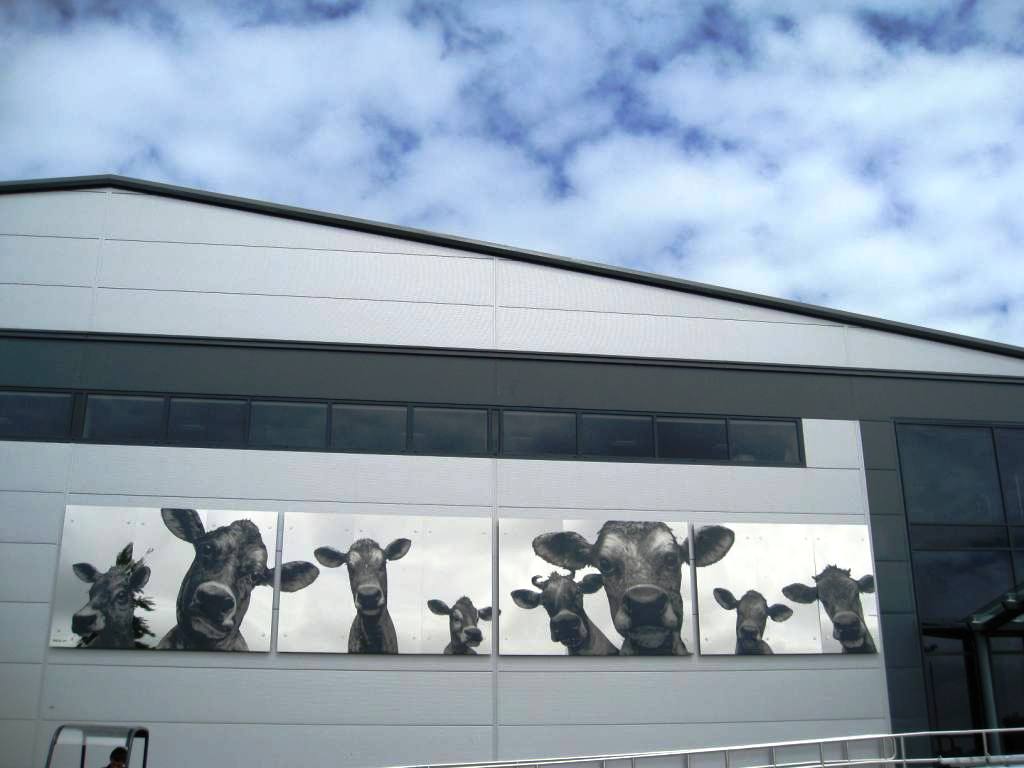
Pictured: Jersey Milk has seen its export sales grow by 400% in the last five years.
Although such actions are, as Mr Garton explains, tantamount to “theft” of the island’s good efforts in collectively marketing its homegrown profits, fortunately they haven’t too heavily dented the export market.
Jersey Milk is doing exceptionally well, with sales having grown “400% in the last five years,” according to Jersey Dairy’s Head of Marketing and Exports, Bob Jones.
“Jersey Dairy had been exporting to the UK for a number of years (Tesco, and Marks and Spencer, were major customers), but the catalyst for a major drive for export business came with the opening of the new dairy manufacturing unit in Trinity in 2010. The new factory offered more production capacity and farmers were keen to supply more milk,” he recalled.
From there, it was able to expand to Hong Kong convenience stores with milk, butter and ice cream, then into mainland China, before hitting Japan, Korea, Taiwan, Myanmar, and, this year, Singapore and the Philippines, while the new Middle Eastern market is also flourishing.
They use the Genuine Jersey trademark to support those sales too, and differentiate themselves. Mr Garton offers an anecdote attesting to its success: “On the shelf in a supermarket in Japan, there were three butters on the shelf. There's a Jersey Dairy Genuine Jersey butter, a Jersey butter from a herd in Japan, and a Jersey butter from a herd in either Australia or New Zealand – the Jersey butter outsold the other two and was at a higher price. The indication was that the Japanese were interested in investing in the genuine product as opposed to copycats.”

Pictured: Genuine Jersey challenges whoever doesn't play the genuine game legally.
And there’s a warning for those who won’t play the genuine game: “we do challenge legally.”
Wearing his brand “policing” hat, Mr Garton speaks of stopping ‘Jersey potato’ seed sellers. “Whenever we come across an infringement in the UK, we use trademark to effectively stop the infringement. This year, we've had six so far and we've taken legal action using local lawyers and we successfully stopped all six infringements. I think there were two on Amazon, four on eBay and two in retail outlets.”
It’s a costly process, but luckily the government is willing to step in and help financially where necessary.
It assisted in one trademark case: Genuine Jersey, Jersey Lavender and the Economic Development Department successfully toppled beauty heavyweight Chanel, who were trying to trademark ‘Jersey’ after their new perfume inspired by Coco’s beloved fabric.
There’s a case rumbling on right now, too. In China, Genuine Jersey are being stopped from trademarking their name, as someone has nabbed the word ‘Jersey.’
“It's something that I've talked to the External Relations Department about recently – it's tricky for us to work at that sort of distance and it costs quite a lot of money… Really, the registrar in China should never have allowed that application to have passed. Over time, one would hope that that trademark will be cancelled and we would be able to register the Genuine Jersey trademark in that territory.”

Pictured: Jersey Hemp is one of many local products looking to export.
Despite the expense, it’s an important fight to fight. If Jersey were to lose its ability to use its name – one for which it has tried so diligently for so many years to build – this would stifle the industries at the island’s heart, as well as emerging enterprises. Jersey Tea, Jersey Sea Salt, Jersey Hemp are all on their way up, and need all the support they can get.
But how to turn the ‘Big Four’ into a ‘Big Five’, six… or seven? Entrepreneur support service, Jersey Business, is available to help local products early on in their export journey.
Their website includes detailed guidance on everything from the logistics of exporting to international payments and engaging with overseas customers, as well as a ‘how to’ guide on visiting the target market.
Identifying a growing need for support in this area, last year they also set up an ‘Export Club’ through which Jersey secured a visit from India’s High Commissioner to build a new trade scheme. At present, they’re working with the Government on building opportunities and breaking down practical barriers in the US for their clients.
Very pleased to be visiting @Salondelagri in Paris this coming weekend. One of the world's biggest agriculture events of 2019 will provide an opportunity to showcase Jersey’s local produce, to promote the island and to strengthen links between Jersey and France #SIA2019 #Paris pic.twitter.com/8KkPWaX0k3
— Sen. Lyndon Farnham (@lyndonfarnham) February 21, 2019
According to the Government’s Rural Adviser, John Vautier, who has 30 years’ experience working in the rural economy, touring trade shows with products are helpful to some degree, but are best viewed as a “diplomatic mission.”
A recent example of this was the Salon International de l’Agriculture, which attracts nearly 700,000 people yearly – including senior politicians. They might be more about gaining regional contacts, but Mr Vautier acknowledges this can have a knock-on effect for trade.
His key advice for product promotion is collaboration and innovation. While prioritising tourism over trade, Visit Jersey’s drive to get Insta-happy food and lifestyle bloggers over is a crafty way to reach new audiences with the best of the island’s offering, while, more traditionally, visiting delegates are routinely being gifted goodie bags.
When members of the British-Irish Council including Scotland’s First Minister Nicola Sturgeon and Irish Taoiseach Leo Varadkar attended a Jersey summit in November 2017 last year, their treats included the first press of Jersey Hemp’s culinary oil.
There are new sectors flourishing, such as Digital – and there’s even future talk of ‘Jersey Medicinal Cannabis’ from Economic Development Minister Lyndon Farnham.
Until such new areas are established, the best way round for Jersey’s produce to seem fresh on the international stage is to “add value” by reworking old products into new.

Pictured: Deputy Carolyn Labey hopes Jersey will soon become known for its innovation.
That is exactly what Deputy Labey has been doing through her cow and finance reclamation efforts. They’re both examples of “innovation” – something she hopes the island, in future, will become known for.
She also hopes that increasing focus – through exports and other international endeavours – on who Jersey is will make islanders proud of their background.
See, image really is everything. According to the Minister, it brings a “sense of belonging” and “community” – something that may encourage young people to stay in the island to work, and beat off the brain drain, as well as engage in politics.
Perhaps that’s wishful thinking, but, again, it’s true that image is everything and underlines every aspect of Jersey life.
So, in 20 years’ time, what does the International Development Minister want people to be saying about the island?
“Oh, Jersey! There’s that unique, beautiful island with gourmet food and fish, country walks and fantastic beaches… It’s the headquarters of the Jersey cow. Even the finance industry is doing good in the world.”
For Mr Garton, the answer is more simple: “Whether that be our finance industry or our tourism sector or our agricultural sector, I'd like to think that there's a thread that runs through all of them, which is that they are sustainable and well managed.”
This article first appeared in April's edition of Connect magazine.
Comments
Comments on this story express the views of the commentator only, not Bailiwick Publishing. We are unable to guarantee the accuracy of any of those comments.